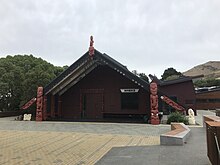Rāpaki

Te Rāpaki-o-Te Rakiwhakaputa, commonly known as Rāpaki or Rapaki, is a small settlement within the Lyttelton Harbour basin.[1]
Rāpaki is one of four Banks Peninsula rūnanga (communities) based around marae (tribal meeting grounds).[2] The Rāpaki Marae, also known as Te Wheke Marae, is a meeting ground of Ngāi Tahu and its Te Hapū o Ngāti Wheke branch.[3] It includes a wharenui (meeting house), called Te Wheke opened in 2008, was carved by Riki Manuel and Fayne Robinson and the tukutuku panels were overseen by local weaver 'Aunty' Doe Parata.[4][5] The carvings of the wharenui trace the almost 400 years of continuous settlement related to the arrival of the ancestor Te Rakiwhakaputa.[5]

Rāpaki is overlooked by the peak Te Poho o Tamatea. According to one legend, the Ngāi Tahu chief Te Rakiwhakaputa named the place by laying his waist mat (rāpaki) down to claim it.[2] The full name of Rāpaki is Te Rāpaki-o-Te Rakiwhakaputa, meaning the waist mat of Te Rakiwhakaputa.[6] On 8 July 2020, the New Zealand Geographic Board assigned the full name as the official name of the locality.[7]
References
- ^ Wilson, John. "Canterbury places – Lyttelton Harbour". Te Ara: The Encyclopedia of New Zealand. Retrieved 14 July 2020.
- ^ a b "Te Hapū o Ngāti Wheke". Te Rūnanga o Ngāi Tahu. Retrieved 14 July 2020.
- ^ "Te Kāhui Māngai directory". tkm.govt.nz. Te Puni Kōkiri.
- ^ "Māori Maps". maorimaps.com. Te Potiki National Trust.
- ^ a b "Te Wheke to be reborn at Rapaki Marae". Stuff. 23 July 2009. Retrieved 17 January 2023.
- ^ Rapaki marae introduction
- ^ "Notice of the Final Determinations of the Minister for Land Information on Official Geographic Names". New Zealand Gazette. New Zealand Government. Retrieved 10 July 2020.
43°36′14″S 172°40′46″E / 43.6040°S 172.6795°E
- Pages using gadget WikiMiniAtlas
- Articles with short description
- Short description matches Wikidata
- Use dmy dates from April 2024
- Use New Zealand English from December 2015
- All Wikipedia articles written in New Zealand English
- Commons category link is on Wikidata
- Coordinates on Wikidata
- Populated places in Canterbury, New Zealand
- All stub articles
- Canterbury, New Zealand geography stubs